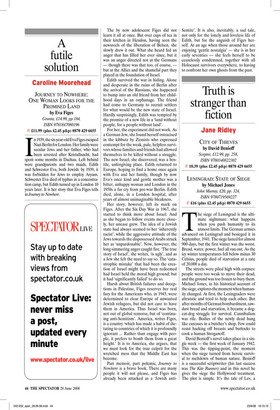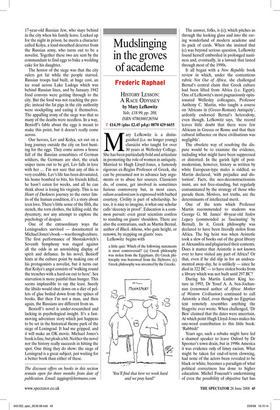Truth is stranger than fiction
Jane Ridley
CITY oF THIEVES by David Benioff Sceptre, £12.99, pp. 258, ISBN 9780340822302 ✆ 10.39 (plus £2.45 p&p) 0870 429 6655 LENINGRAD: STATE oF SIEGE by Michael Jones John Murray, £20, pp. 324, ISBN 9780719569227 ✆ £16 (plus £2.45 p&p) 0870 429 6655 The siege of Leningrad is the ultimate nightmare: what happens when you push humanity to its utmost limits. The German armies advanced on Leningrad and besieged it in September, 1941. The siege lasted for almost 900 days, but the first winter was the worst. Bread, water, power, fuel all ran out. As the icy winter temperatures fell below minus 30 Celsius, people died of starvation at a rate of 20,000 a day.
The streets were piled high with corpses: people were too weak to move their dead, and the ground was too frozen to bury them. Michael Jones, in his historical account of the siege, explores the moment when humanity changed. At first, the Leningraders were altruistic and tried to help each other. But after months of German bombardment, sawdust bread and starvation, it became a dogeat-dog struggle for survival. Cannibalism was rife. Bodies of the newly dead hung like carcases in a butcher’s shop. Few could resist hacking off breasts and buttocks to cook a human Stroganoff.
David Benioff’s novel takes place in a single week — the first week of January 1942. This was the tipping-point, the moment when the siege turned from heroic survival to meltdown of human nature. Benioff is a successful scriptwriter (his last success was The Kite Runner) and in this novel he gives the siege the Hollywood treatment. The plot is simple. It’s the tale of Lev, a 17-year-old Russian Jew, who stays behind in the city when his family leave. Locked up for the night in prison, he meets a character called Kolya, a loud-mouthed deserter from the Russian army, who turns out to be a novelist. Together these two are sent by the commandant to find eggs to bake a wedding cake for his daughter.
The horror of the siege was that the city rulers got fat while the people starved. Russian troops had built, at huge cost, an ice road across Lake Ladoga which was behind Russian lines, and by January 1942 food convoys were getting through to the city. But the food was not reaching the people; instead the fat pigs in the city authority were stockpiling and eating it themselves. The appalling irony of the siege was that so many of the deaths were needless. In a way, Benioff’s fable about the eggs is meant to make this point, but it doesn’t really come across.
Our heroes, Lev and Kolya, set out on a long journey outside the city on foot hunting for the eggs. They come across a house full of the Russian concubines of German soldiers, the Germans are shot, the crack sniper turns out to be girl, Lev falls in love with her ... I’m not sure that any of this is very credible. Lev’s life has been devastated, his home bombed to bits, his friends killed, he hasn’t eaten for weeks, and all he can think about is losing his virginity. This is no Heart of Darkness journey to the outer limits of the human condition, it’s a story about teen love. There’s little sense of the filth, the stench, the torn clothes, the killing cold, the dysentery, nor any attempt to explore the psychology of despair.
One of the extraordinary ways the Leningraders survived — documented in Michael Jones’s book — was through culture. The first performance of Shostakovitch’s Seventh Symphony was staged against all the odds in an astonishing display of spirit and defiance. In his novel, Benioff hints at the culture point by making one of his protagonists a novelist, but it turns out that Kolya’s angst consists of ‘walking round the trenches with a hard-on out to here’. Sex starvation is more painful than hunger. This seems implausible to say the least. Surely the libido would shut down on a diet of pellets of glue boiled down from the spines of books. But then I’m not a man, and then again, the Russians are different from us.
Benioff’s novel is under-researched and lacking in psychological insight. It’s a fastmoving adventure story which just happens to be set in the historical theme park of the siege of Leningrad. It had me gripped, and it will make an OK movie. Michael Jones’s book is fine, but plods a bit. Neither the novel nor the history really succeeds in hitting the spot. One thing they do show: the siege of Leningrad is a great subject, just waiting for a better book than either of these.
The discount offers on books in this section remain open for three months from date of publication. Email: taggings@bertrams.com



















































































 Previous page
Previous page